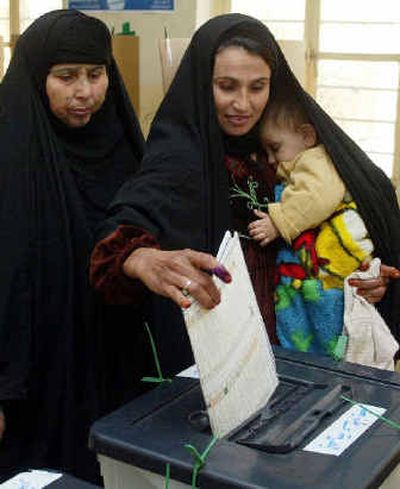Wave of optimism in Shiite heartland

NAJAF, Iraq – They came in wheelchairs and on crutches. Some dressed in new clothes as if it were a holiday. Others brought their children along to watch history being made.
Here in the capital of Iraq’s Shiite Muslim heartland, fears of insurgent violence were dwarfed by a wave of electoral optimism. Seemingly worlds away from the anxiety witnessed in other parts of the country, Najaf’s election day passed in the atmosphere of a heavily guarded carnival.
Again and again voters referred to the day as an “irris,” a celebration.
“I kissed the ballot box,” said 46-year-old merchant Sadik Zwain. “It’s a celebration, a turning point and a step toward the correct direction, toward the independence, toward getting rid of occupation.”
Galvanized by the urgings of top Shiite religious leader Grand Ayatollah Ali Sistani, who equated voting with a religious duty, and by the promise of a long-sought political ascension for Iraq’s Shiite majority, Najafis turned out in droves to vote.
The day started slowly, with citizens walking in small groups on a cold, misty morning through streets devoid of traffic.
Munthir Hamid Moussa, a Najaf currency trader, showed up at his local polling station five minutes before its 7 a.m. opening and found about 65 people already in line.
“The voters were there, and the (Electoral Commission) employees were still half asleep,” he said, chuckling.
By 8:45 a.m., long lines segregating men from women snaked around the walls of the Gomhuriya Middle School in the working-class district of Judayda. Children played among the crowds as their parents clutched registration forms. Around some stations, volunteers shuttled elderly residents from their homes to the polling place on wheelchairs.
The generally festive air belied the near-total security lockdown of the city.
Only cars bearing large permission stickers from the governorate were allowed to be on the streets. Police snipers peered from neighboring rooftops around polling stations, and plainclothes officers patrolled the crowd. All voters were subjected to an extensive pat-down, with black-clad women stepping into makeshift cloth-screened enclosures in deference to conservative local traditions.
Outside one polling center in Najaf’s Old City, visitors wishing to enter had to turn in not only cell phones and cameras, but watches, matches, pens and asthma inhalers.
Despite the fears that insurgents seeking to wreck the election would target Najaf, the local Electoral Commission estimated voter turnout at 85 percent. It was difficult to find someone in Najaf who did not proudly display an indelible-ink-stained index finger.
Some of those who did not vote said it wasn’t for political reasons or fear of attack. Outside the Arab Revolution Middle School, Muhammed Hassan Mahdi, a 39-year-old copy shop owner, found that his name wasn’t on the voter lists due to a mistake in a registration process that was based on Iraq’s welfare rolls.
“Sistani gave an order that not voting is a sin,” he said despondently.
But Mahdi’s passion to participate didn’t quite match his actual knowledge of the proceedings. He had planned to vote for both interim Prime Minister Ayad Allawi’s slate and the Unified Iraqi Alliance coalition that Sistani helped organize. When told he would have had to pick one or the other, Mahdi said, “If I have to choose, it will be the candle,” the Alliance’s symbol.
In dozens of interviews in several neighborhoods on Sunday, more than two-thirds of voters expressed support for the Alliance, with the rest favoring Allawi. Nobody mentioned a third slate.
Allawi has run an aggressive campaign that, combined with his perception as a forceful leader, seems to have overcome his initial reputation as a puppet for the United States.
“Allawi is a strong man, and Iraq needs a man like this,” said 25-year-old Iyad Nasser Muhammed.
A Najaf police officer who refused to give his name put it more bluntly.
“We need someone scary,” he said.
But amid the hope, some sounded a downbeat note over the price paid to reach this day. Many Najaf residents lost family members to deposed dictator Saddam Hussein’s Baathist regime.
Tears welled in the eyes of Ezzedine Hakim, the son of prominent Shiite cleric Muhammed Saeed Hakim, when asked what Sunday meant to him.
“Today reminds us of our victims,” he said.